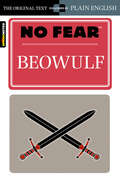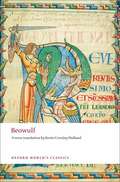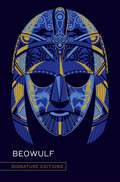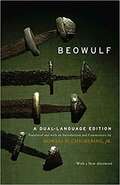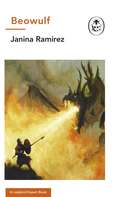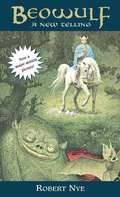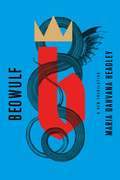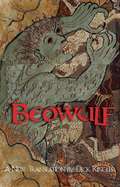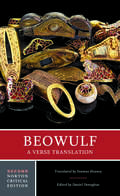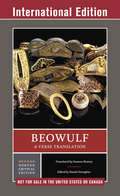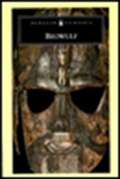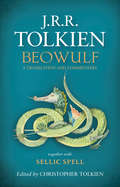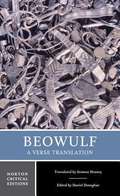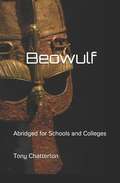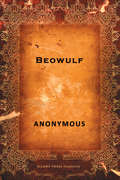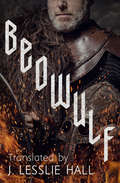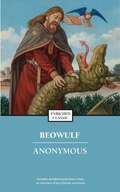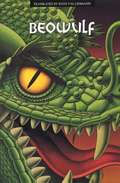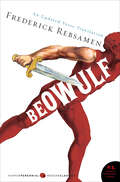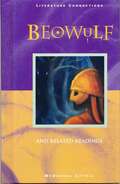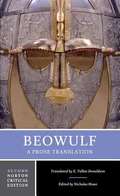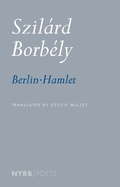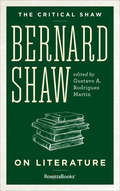- Table View
- List View
Beowulf (No Fear #3)
by SparkNotesRead great works of literature with NO FEAR—and actually understand what they mean!No Fear Literature puts the world&’s finest books at your fingertips! With the complete original text on the left-hand page, and an easy-to-follow translation on the right to guide you, you can fully grasp the meaning and brilliance of each classic. Although Beowulf is a masterpiece of early English literature, written approximately between 975 and 1025, the unfamiliar dialect makes this epic poem difficult to understand. Thanks to this translation, placed right near the original text, readers can now appreciate the battle of good and evil that unfolds between the wise and heroic Beowulf and his enemies—the monstrous Grendel and a fire-breathing dragon. Each No Fear guide contains: The complete original textA line-by-line translation that puts the text into everyday languageA complete list of characters with descriptionsPlenty of helpful commentary
Beowulf (Oxford World's Classics)
by Kevin Crossley-Holland Heather O'DonoghueBeowulf is the longest and finest literary work to have come down to us from Anglo-Saxon times, and one of the world's greatest epic poems. Set in the half-legendary, half historical Scandinavian past, it tells the story of the hero Beowulf, who comes to the aid of the Danish king Hrothgar by killing first the terrifying, demonic monster Grendel, and then Grendel's infuriated and vengeful mother. A lifetime later, Beowulf's own kingdom, Geatland, is threatened by a fiery dragon; Beowulf heroically takes on this challenge, but himself dies killing the dragon. The poem celebrates the virtues of the heroic life, but Hrothgar and Beowulf are beacons of wisdom and courage in a dark world of feuds, violence and uncertainty, and Beowulf's selfless heroism is set against a background of ruthless power struggles, fratricide and tyranny. This acclaimed translation is complemented by a critical introduction and substantial editorial apparatus. `The poem has at last found its translator . . .supremely well done' Charles Causley ABOUT THE SERIES: For over 100 years Oxford World's Classics has made available the widest range of literature from around the globe. Each affordable volume reflects Oxford's commitment to scholarship, providing the most accurate text plus a wealth of other valuable features, including expert introductions by leading authorities, helpful notes to clarify the text, up-to-date bibliographies for further study, and much more.
Beowulf (Signature Editions)
by AnonymousComposed toward the end of the first millennium, Beowulf is the elegiac narrative of the adventures of Beowulf, a Scandinavian hero who saves the Danes from the seemingly invincible monster Grendel and, later, from Grendel's mother. He then returns to his own country and dies in old age in a vivid fight against a dragon. The poem is about encountering the monstrous, defeating it, and then having to live on in the exhausted aftermath.
Beowulf: A Dual-Language Edition
by Howell D. ChickeringThe first major poem in English literature, Beowulf tells the story of the life and death of the legendary hero Beowulf in his three great battles with supernatural monsters. The ideal Anglo-Saxon warrior-aristocrat, Beowulf is an example of the heroic spirit at its finest. <p><p> Leading Beowulf scholar Howell D. Chickering, Jr.’s, fresh and lively translation, featuring the Old English on facing pages, allows the reader to encounter Beowulf as poetry. This edition incorporates recent scholarship and provides historical and literary context for the modern reader.
Beowulf: A Ladybird Expert Book (The Ladybird Expert Series #26)
by Janina RamirezPart of the ALL-NEW LADYBIRD EXPERT SERIES'This accessible illustrated guide is a great introduction to the story, its origins and its enduring legacy' BBC HISTORY- Which is more terrifying - a monster or its mother? - Why did Berserkers run naked into battle? - How was the story of Beowulf almost lost forever?PLUNGE into the adventures of Beowulf, the 6th Century hero who defeated the monster Grendel, became king of his people, and slayed a tremendous dragon. Surviving in a single, burnt manuscript, Beowulf continues to entrance readers and inspire major works of fantasy today.WARRIORS. MONSTERS. DRAGONS. GOLD.Janina Ramirez's Beowulf is an accessible and authoritative guide to the spellbinding world and daring feats of a poem remembered through the centuries.
Beowulf: A New Telling
by Robert NyeHe comes out of the darkness, moving in on his victims in deadly silence. When he leaves, a trail of blood is all that remains. He is a monster, Grendel, and all who know of him live in fear. Hrothgar, the king of the Danes, knows something must be done to stop Grendel. But who will guard the great hall he has built, where so many men have lost their lives to the monster while keeping watch? Only one man dares to stand up to Grendel's fury --Beowulf.
Beowulf: A New Translation
by Maria Dahvana HeadleyNamed one of the Best Poetry Books of 2021 by The GuardianLonglisted for the 2021 National Translation Award in Poetry. Picked for Kirkus Reviews’ Best Fiction in Translation of 2020. Named a Book of the Year by NPR, Vox, and The New Statesman. Picked for Loyalty Books’ Holiday List. A new, feminist translation of Beowulf by the author of the much-buzzed-about novel The Mere Wife"Brash and belligerent, lunatic and invigorating, with passages of sublime poetry punctuated by obscenities and social-media shorthand." —Ruth Franklin, The New Yorker"The author of the crazy-cool Beowulf-inspired novel The Mere Wife tackles the Old English epic poem with a fierce new feminist translation that radically recontextualizes the tale." —Barbara VanDenburgh, USA TodayNearly twenty years after Seamus Heaney’s translation of Beowulf—and fifty years after the translation that continues to torment high-school students around the world—there is a radical new verse translation of the epic poem by Maria Dahvana Headley, which brings to light elements that have never before been translated into English, recontextualizing the binary narrative of monsters and heroes into a tale in which the two categories often entwine, justice is rarely served, and dragons live among us. A man seeks to prove himself as a hero. A monster seeks silence in his territory. A warrior seeks to avenge her murdered son. A dragon ends it all. The familiar elements of the epic poem are seen with a novelist’s eye toward gender, genre, and history—Beowulf has always been a tale of entitlement and encroachment, powerful men seeking to become more powerful, and one woman seeking justice for her child, but this version brings new context to an old story. While crafting her contemporary adaptation of Beowulf, Headley unearthed significant shifts lost over centuries of translation.
Beowulf: A New Translation for Oral Delivery
by Dick RinglerDick Ringler's deceptively simple translation captures the rhythm, movement, and power of the original Old English poem while employing a fluid modern English style and a relatively spare vocabulary. His generous Introduction, a lively yet masterly guide to the work, along with his translations of three shorter Old English poems elucidate a major English text almost as well-known for its subtlety and intricacy as it is for its monsters and heroes.
Beowulf: A Norton Critical Edition (Critical Editions Ser. #0)
by Daniel Donoghue“Accomplishes what before now had seemed impossible: a faithful rendering that is simultaneously an original and gripping poem in its own right.” —New York Times Book Review “Excellent ancillary materials in this critical edition make a potentially alienating text and culture accessible and engaging.” —Tim Melnarik, California State University, San Bernardino This Norton Critical Edition includes: • Nobel Laureate Seamus Heaney’s poetic translation of the great Anglo-Saxon epic—winner of the Whitbread Prize—along with his translator’s introduction. • Detailed explanatory annotations and an introduction to Old English language and prosody by Daniel Donoghue. • More than two dozen visuals, including, new to the Second Edition, a fine selection of objects from the Staffordshire Hoard. • A rich array of Anglo-Saxon and early northern civilization materials, providing student readers with Beowulf’s cultural and historical context. • Nine critical interpretations, three of them new to the Second Edition. • A glossary of personal names and a selected bibliography. About the Series Read by more than 12 million students over fifty-five years, Norton Critical Editions set the standard for apparatus that is right for undergraduate readers. The three-part format—annotated text, contexts, and criticism—helps students to better understand, analyze, and appreciate the literature, while opening a wide range of teaching possibilities for instructors. Whether in print or in digital format, Norton Critical Editions provide all the resources students need.
Beowulf: A Norton Critical Edition And International Student Edition (Norton Critical Editions #0)
by Daniel Donoghue“Accomplishes what before now had seemed impossible: a faithful rendering that is simultaneously an original and gripping poem in its own right.” —New York Times Book Review “Excellent ancillary materials in this critical edition make a potentially alienating text and culture accessible and engaging.” —Tim Melnarik, California State University, San Bernardino This Norton Critical Edition includes: • Nobel Laureate Seamus Heaney’s poetic translation of the great Anglo-Saxon epic—winner of the Whitbread Prize—along with his translator’s introduction. • Detailed explanatory annotations and an introduction to Old English language and prosody by Daniel Donoghue. • More than two dozen visuals, including, new to the Second Edition, a fine selection of objects from the Staffordshire Hoard. • A rich array of Anglo-Saxon and early northern civilization materials, providing student readers with Beowulf’s cultural and historical context. • Nine critical interpretations, three of them new to the Second Edition. • A glossary of personal names and a selected bibliography. About the Series Read by more than 12 million students over fifty-five years, Norton Critical Editions set the standard for apparatus that is right for undergraduate readers. The three-part format—annotated text, contexts, and criticism—helps students to better understand, analyze, and appreciate the literature, while opening a wide range of teaching possibilities for instructors. Whether in print or in digital format, Norton Critical Editions provide all the resources students need.
Beowulf: A Prose Translation
by David WrightThe greatest surviving Old English poem rendered into modern prose Beowulf stands at the head of English literature; a poem of historical interest and epic scope. Although the first manuscript of Beowulf dates from around the year 1000 CE, it is thought that the poem existed in its present form from the year 850. Beowulf's adventures themselves stand in front of the wide historical canvas of 5th and 6th century Scandinavia. Against this heroic background of feuding and feasting, Beowulf first kills the monster Grendel and her mother, and later defends his people against a dragon in a battle that leaves them both mortally wounded. For more than seventy years, Penguin has been the leading publisher of classic literature in the English-speaking world. With more than 1,700 titles, Penguin Classics represents a global bookshelf of the best works throughout history and across genres and disciplines. Readers trust the series to provide authoritative texts enhanced by introductions and notes by distinguished scholars and contemporary authors, as well as up-to-date translations by award-winning translators.
Beowulf: A Translation And Commentary
by J. R. R. Tolkien Christopher TolkienThe translation of Beowulf by J.R.R. Tolkien was an early work, very distinctive in its mode, completed in 1926: he returned to it later to make hasty corrections, but seems never to have considered its publication. This edition is twofold, for there exists an illuminating commentary on the text of the poem by the translator himself, in the written form of a series of lectures given at Oxford in the 1930s; and from these lectures a substantial selection has been made, to form also a commentary on the translation in this book. From his creative attention to detail in these lectures there arises a sense of the immediacy and clarity of his vision. It is as if he entered into the imagined past: standing beside Beowulf and his men shaking out their mail-shirts as they beached their ship on the coast of Denmark, listening to the rising anger of Beowulf at the taunting of Unferth, or looking up in amazement at Grendel's terrible hand set under the roof of Heorot. But the commentary in this book includes also much from those lectures in which, while always anchored in the text, he expressed his wider perceptions. He looks closely at the dragon that would slay Beowulf "snuffling in baffled rage and injured greed when he discovers the theft of the cup"; but he rebuts the notion that this is "a mere treasure story", "just another dragon tale". He turns to the lines that tell of the burying of the golden things long ago, and observes that it is "the feeling for the treasure itself, this sad history" that raises it to another level. "The whole thing is sombre, tragic, sinister, curiously real. The 'treasure' is not just some lucky wealth that will enable the finder to have a good time, or marry the princess. It is laden with history, leading back into the dark heathen ages beyond the memory of song, but not beyond the reach of imagination." Sellic spell, a "marvellous tale", is a story written by Tolkien suggesting what might have been the form and style of an Old English folk-tale of Beowulf, in which there was no association with the "historical legends" of the Northern kingdoms.
Beowulf: A Translation and Commentary
by J.R.R. TolkienNew York Times bestseller“A thrill . . . Beowulf was Tolkien’s lodestar. Everything he did led up to or away from it.” —New Yorker J.R.R. Tolkien completed his translation of Beowulf in 1926: he returned to it later to make hasty corrections, but seems never to have considered its publication. This edition includes an illuminating written commentary on the poem by the translator himself, drawn from a series of lectures he gave at Oxford in the 1930s. His creative attention to detail in these lectures gives rise to a sense of the immediacy and clarity of his vision. It is as if Tolkien entered into the imagined past: standing beside Beowulf and his men shaking out their mail-shirts as they beach their ship on the coast of Denmark, listening to Beowulf’s rising anger at Unferth’s taunting, or looking up in amazement at Grendel’s terrible hand set under the roof of Heorot. “Essential for students of the Old English poem—and the ideal gift for devotees of the One Ring.” —Kirkus
Beowulf: A Verse Translation
by Seamus Heaney Daniel DonoghueThe translation that "rides boldly through the reefs of scholarship" (The Observer) is combined with first-rate annotation. No reading knowledge of Old English is assumed. Heaney's clear and insightful introduction to Beowulf provides students with an understanding of both the poem's history in the canon and Heaney's own translation process.
Beowulf: Abridged For Schools And Colleges
by Tony ChattertonBeyond the desolate moors and marshes is Hrothgar's lighted hall, holding out against the encroaching dark. A mead-hall revered by all Norsemen, until one night Grendel, the fen-demon, bursts through the door.Beowulf is an epic Anglo-Saxon poem which is both subtle and savage. For many English speakers it is the first great epic, one that brings vividly to life their forefathers and their love of adventure.This abridged version of the epic poem is based upon two authoritative translations of the Nowell Codex manuscript. Digressions and genealogies (apart from Hrothgar's) have been removed, leaving a clear narrative that focuses on the character of Beowulf and the events surrounding him.The translation has been written for the classroom and for the would-be Anglo-Saxon scholar wanting an accessible introduction to the poem. It includes a guide to the characters, the history of the poem, a brief summary, a simplified prose version and activities for the classroom.
Beowulf: An Anglo-Saxon Epic Poem
by Anonymous John Lesslie HallComposed toward the end of the first millennium, Beowulf is the elegiac narrative of the adventures of Beowulf, a Scandinavian hero who saves the Danes from the seemingly invincible monster Grendel and, later, from Grendel's mother. He then returns to his own country and dies in old age in a vivid fight against a dragon. The poem is about encountering the monstrous, defeating it, and then having to live on in the exhausted aftermath.
Beowulf: An Anglo-saxon Epic Poem
by AnonymousSet in sixth-century Scandinavia, this epic poem recounts a hero&’s battles against horrific monsters. Hrothgar, the king of the Danes, finds his domain threatened by the beast Grendel. Miraculously, a hero from the Geats seafaring tribe, Beowulf, arrives and slaughters Grendel, saving the Danes. Yet nearly as soon as Grendel is slain, Beowulf must face another foe: Grendel&’s mother. This millennium-old work of literature tells of Beowulf&’s fierce fights during his fifty-year rule over his people—as well as his ultimate battle against a fire-breathing dragon who has wreaked chaos and destruction upon the Geats. This famous and powerful scene was the first appearance of a dragon-slayer in English literature.
Beowulf: An Anglo-saxon Epic Poem (Enriched Classics)
by Anonymous<P>The story of one man's triumph over a legendary monster, Beowulf marks the beginning of Anglo-Saxon literature as we know it today. <P>This Enriched Classic includes: <br>• A concise introduction that gives readers important background information <br>• A timeline of significant events that provides the book's historical context <br>• An outline of key themes and plot points to help readers form their own interpretations <br>• Detailed explanatory notes <br>• Critical analysis and modern perspectives on the work <br>• Discussion questions to promote lively classroom and book group interaction <br>• <P>A list of recommended related books and films to broaden the reader's experience Enriched Classics offer readers affordable editions of great works of literature enhanced by helpful notes and insightful commentary. <P>The scholarship provided in Enriched Classics enables readers to appreciate, understand, and enjoy the world's finest books to their full potential. Series edited by Cynthia Brantley Johnson
Beowulf: An Imitative Translation
by Ruth P. M. LehmannThe name "Beowulf" lingers in our collective memory, although today fewer people have heard the tale of the Germanic hero's fight with Grendel, the dreadful Monster of the Mere, as recounted in this Anglo-Saxon epic. This edition of Beowulf makes the poem more accessible than ever before. Ruth Lehmann's imitative translation is the only one available that preserves both the story line of the poem and the alliterative versification of the Anglo-Saxon original. The characteristic features of Anglo-Saxon poetry- alliterative verse with first-syllable stress, flexible word order, and inflectional endings-have largely disappeared in Modern English, creating special problems for the translator. Indeed, many other translations of Beowulf currently available are either in prose or in some modern poetic form. Dr. Lehmann's translation alone conveys the "feel" of the original, its rhythm and sound, the powerful directness of the Germanic vocabulary. In her introduction, Dr. Lehmann gives a succinct summary of the poem's plot, touching on the important themes of obligation and loyalty, of family feuds, unforgivable crimes, the necessity of revenge, and the internal and external struggles of the Scandinavian tribes. She also describes the translation process in some detail, stating the guiding principles she used and the inevitable compromises that were sometimes necessary.
Beowulf: An Updated Verse Translation (Perennial Classics)
by Frederick RebsamenThis acclaimed modern verse translation of the timeless epic of bravery and battle captures the drama and tone of the Old English narrative poem.Here is the stirring legend of Beowulf, the great hero who saves the Danish king from the monster Grendel—only to face the avenging wrath of Grendel’s Mother. The first masterpiece of English literature, it has survived for centuries, passed down across generations through numerous versions. In this modern verse translation, Frederick Rebsamen conjures both the excitement of Beowulf’s adventures and the richness of the Old English poetic form.“No self-respecting college professor will want his students to be without it . . . With the subtle rules of alliteration, stress, and pause in place—and with a translator bold enough to invent his own vigorous and imaginative compound nouns—the poem suddenly takes flight and carries us to the highest mountains of achievement.” —Booklist“There are lots of translations of Beowulf floating around, some prose, some poetry, but none manages to capture the feel and tone of the original as well as this one.” —Dick Ringler, Professor of English and Scandinavian Studies, University of Wisconsin-Madison
Beowulf: And Related Readings (Literature Connections)
by Burton RaffelBeowulf, and Related Readings
Beowulf: Contexts, Criticism
by E. Talbot Donaldson Nicholas HoweThe text of this edition of "Beowulf" is based on the highly regarded Donaldson prose translation of the Anglo-Saxon epic poem.
Berlin-Hamlet
by Ottilie Mulzet Szilard BorbelyBefore his tragic death, Szilárd Borbély had gained a name as one of Europe's most searching new poets. Berlin-Hamlet--one of his major works--evokes a stroll through the phantasmagoric shopping arcades described in Walter Benjamin's Arcades Project, but instead of the delirious image fragments of nineteenth-century European culture, we pass by disembodied scraps of written text, remnants as ghostly as their authors: primarily Franz Kafka but also Benjamin himself or the Hungarian poets Attila József or Erno Szép. Paraphrases and reworked quotations, drawing upon the vanished prewar legacy, particularly its German Jewish aspects, appear in sharp juxtaposition with images of post-1989 Berlin frantically rebuilding itself in the wake of German reunification.
Bernard Shaw on Literature: On Literature (The Critical Shaw)
by George Bernard ShawA collection of literary criticism from the Nobel Prize–winning playwright behind such classics as Saint Joan and Pygmalion.The Critical Shaw: On Literature is a comprehensive selection of renowned Irish playwright and Nobel Laureate Bernard Shaw&’s ideas and opinions on a wide range of literary forms of expression, from Shakespearean drama to ghost stories, from naturalist novels to philosophical essays. Shaw meticulously applied his comprehensive knowledge of the intricacies of writing and publishing (composition, typesetting, style, themes, censorship) and in the process produced an extensive array of critical works spanning more than fifty years. Always with an axe to grind—whether aesthetic, ethical, or otherwise—Shaw tested the boundaries of satire in his critical essays, occasionally locking horns as a result with some of the most prominent authors of his lifetime. Displaying wit and wisdom in equal proportions, some of his reviews remain fresh even though the authors and books they appraised have long since fallen into oblivion. Shaw&’s views about literature challenged established conventions of the canon and helped to shape a renewed collective concept of literature.The Critical Shaw series brings together, in five volumes and from a wide range of sources, selections from Bernard Shaw&’s voluminous writings on topics that exercised him for the whole of his professional career: Literature, Music, Politics, Religion, and Theater. The volumes are edited by leading Shaw scholars, and all include an introduction, a chronology of Shaw&’s life and works, annotated texts, and a bibliography. The series editor is L.W. Conolly, literary adviser to the Shaw Estate and former president of the International Shaw Society.
